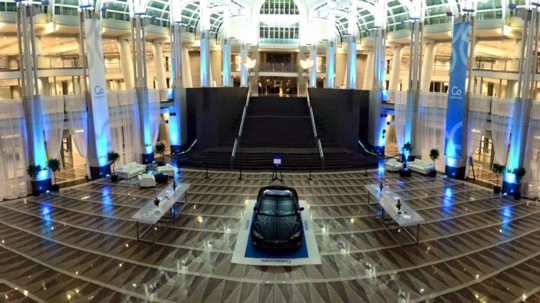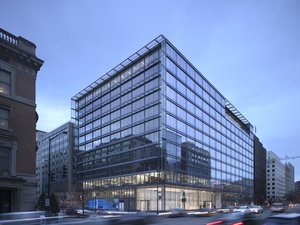
Building a startup isn’t easy. You know the stat – 90 percent of new companies fail.
Developing the right idea takes time, finding funding is always a challenge and becoming profitable can be nearly impossible.
Few know that better than Adam Zuckerman, who for eight years has helped D.C.-area entrepreneurs build companies and find work through Fosterly.
The group launched in 2011 as an entrepreneur network in the Greater Washington region, aiming to connect early-stage founders through its website and events.
It grew to include a coffeeshop meetup group, a large online directory for entrepreneurs, job-matching partnerships with other companies and other resources. Its largest single event, Collaborate, took place in January 2015 and hosted more than 1,500 people.
Unfortunately, Zuckerman and everyone else at Fosterly had other full-time jobs. Some of its initiatives took up so much time that only a full-time staff could do them justice, and the manpower wasn't there. Though it announced a formal wind-down last year, Fosterly does still exist in a smaller form, working on a narrow portfolio of startup support projects.
To examine Fosterly's story and identify its "cause of death," DC Inno chatted with Zuckerman about what his organization set out to do, why he (mostly) shut it down and what important lessons he learned along the way.
Why’d you launch Fosterly in the first place, and what did it do?
Fosterly started as an informal coworking event for entrepreneurs at a local coffee shop and evolved into a community of entrepreneurs, creators, creatives and collaborators, all working together to tackle new challenges in business and technology. We connect our members with resources, events, and opportunities, both online and offline and served as a nexus point for the creative economy and a convener of top influencers in D.C., Maryland and Virginia, often focusing our activities to address identified needs of the community.
What were the biggest milestones or successes throughout the group's history?
This is a difficult question to answer, because we shifted the focus of our offering nearly every year. If I had to choose one thing it would be that there are hundreds of people working in the D.C. region as a result of Fosterly activities – from our numerous internship matches, co-founders meeting each other, etc. Our goal was to help people – not companies – and to help people grow their companies, get their foot in the door where they otherwise might have struggled to do so, and build meaningful relationships was a fantastic result.
What ultimately led you to the decision to shut down the organization?
There were several factors that led to the decision to scale back operations. Primarily, Fosterly served a distinct purpose of filling gaps in the innovation and entrepreneurship ecosystem, and that's evident in the specific activities that Fosterly organized as the years went on. The leadership at Fosterly reached the point where we decided that there was enough momentum in the ecosystem that it no longer made sense for us to carve out the time necessitated by our larger and larger endeavors, such as 1,500-plus person conferences. However, what most people don't know is that Fosterly – as a legal entity and ongoing concern – still exists, but focused on a more narrow set of opportunities. For example, we just guided Tulane University on how to create their Greater New Orleans Startup Report.
Aside from acquiring full-timers, could shutting down have been avoided in any way?
Yes, but that would have fundamentally shifted the model of how we operated. In doing so, we would have shifted the structure from an LLC to a nonprofit and created a board to run things. That said, as the community has grown significantly over the course of the past eight years we didn't feel we needed to do so.
If you had to in just one sentence, what would you label as Fosterly's 'cause of death?'
Recognizing that Fosterly isn't completely dormant, the public announcement at the end of last year was a public signal that the Fosterly team was shifting how and where we allocated our time.
What are the biggest lessons you learned from the experience?
Building relationships is far more important than networking, and timing is unbelievably important.
How has Fosterly's journey personally affected you, outside of the office? Are there aspects of it that translate into your new post at Public Democracy?
Of course! Fosterly was always a part-time job for me and an outlet for me to meet and potential help as many people as possible. In a similar fashion, Public Democracy (a certified B Corp) has a goal of helping people on a national level through a massive data set, behavioral modeling, and an advanced AI based marketing methodology. We've worked on the nation's opioid epidemic, healthcare issues, veterans issues, justice reform and more.
If you could go back and give yourself one piece of advice before launching Fosterly, what would it be?
Go all in. It would have been fun to see how things would have turned out if we tried to get Fosterly scaled to other cities, raised a fund and expanded our job offerings. It's not a regret that we didn't go down that path, but it would be interesting to see how things would have played out if we did.




